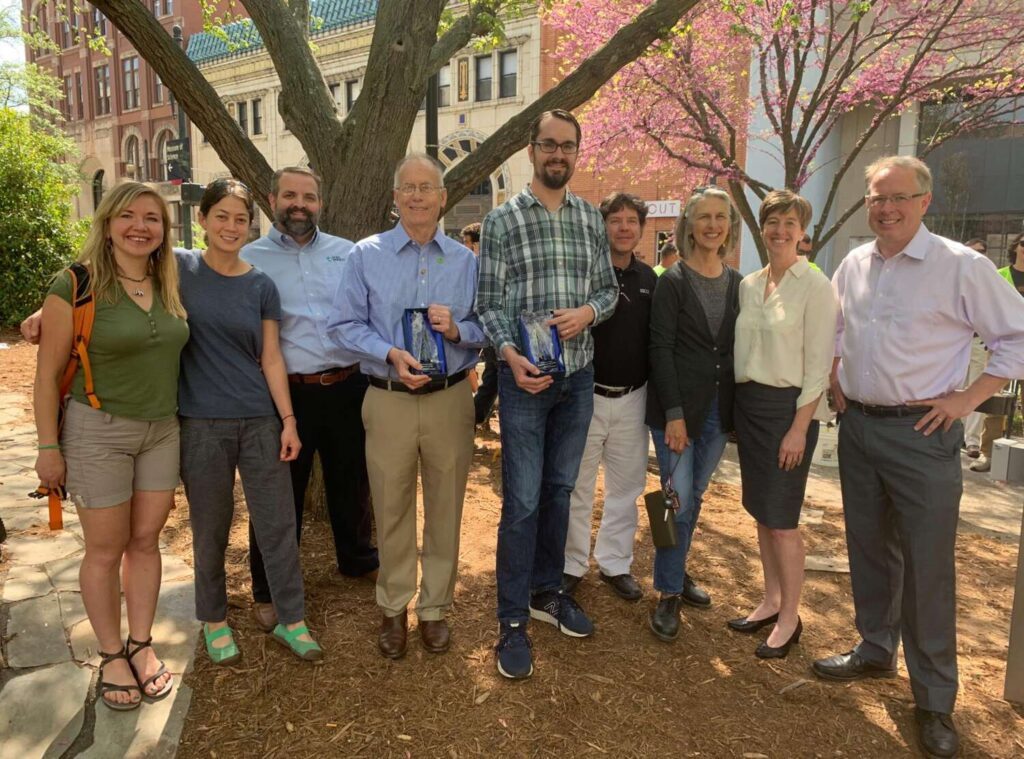With more than two years of success in meeting the goals outlined for its community-focused campaign, Blue Horizons Project is excited for the next phase in its evolution and an expanded involvement in the region’s efforts to transition to 100 percent renewable energy in the next two decades.

Following a joint Request for Proposals from the city and county, Green Built Alliance was selected in the summer of 2020 to continue implementing the work of the Blue Horizons Project.
“We are thrilled at the opportunity to continue and build upon the first two years of the Blue Horizons Project, and are looking forward to a broader scope of work and new opportunities to deepen our relationships within the community to work together for clean energy,” Blue Horizons Project Coordinator Sophie Mullinax said. “We’re grateful for the trust the City of Asheville and Buncombe County have placed in us.”
After years of planning under the leadership of the Energy Innovation Task Force, Blue Horizons Project was launched in March of 2018 to make a clean-energy future a reality in Buncombe County by improving access to and engagement in the wide variety of programs and resources available to local residents and businesses.
Through a suite of strategic energy-efficiency and demand-response solutions, Blue Horizons Project has positioned itself over the past two years as a comprehensive hub of programs to empower community members to save money and reduce the area’s peak energy demand.
In one pivotal early success, Blue Horizons Project was credited with playing a key role in influencing Duke Energy’s decision to take off the table plans to build a natural gas peaker plant—one of the core concerns that prompted the formation of the Energy Innovation Task Force in early 2016.
As Green Built Alliance carries forward the clean-energy torch through this work, many of the Blue Horizons Project’s efforts will stay consistent. As it did in its first two years, Blue Horizons Project will continue providing resources for residents and businesses to reduce energy demand and consumption, as well as adopt renewable energy.
Also remaining steady is the involvement of Energy Savers Network (ESN) in completing weatherization and energy-efficiency upgrades in low-income homes. One new layer within that is a partnership between ESN and Green Opportunities and United Community Development, which will both serve as subcontractors on the work in low-income homes.
“We are excited to partner with these minority-led organizations embedded in communities we seek to serve,” Mullinax said.

In an exciting new development, Blue Horizons Project plans to launch a solarize campaign in Buncombe County in partnership with Solar CrowdSource, a platform that facilitates residential and commercial solar installations, often at below market-rate pricing. Blue Horizons Project will host public events and connect with neighborhood associations to inspire and inform residents to go solar, and select local solar installers to participate by offering free site evaluations and quotes for homes and businesses.
Homeowners will benefit from lower pricing for solar installations; access to vetted contractors; and a streamlined process. Local solar installers will benefit from reduced customer recruitment costs, as well as improved and increased community relationships.
It is difficult to determine exactly how much photovoltaic capacity could be installed via these efforts, but the program’s goal is 1 MW in 2020, 2 MW in 2021, and 4 MW in 2022.
The solarize campaign is one of several strategies being adopted to ensure Buncombe County’s progress toward its goal of reaching 100 percent renewable energy for the community by 2042. With increasing focus in year two of the three-year contract, Blue Horizons Project will be engaged in creating a strategic plan for achieving 100 percent renewable energy.
“It will start with a foundation of energy efficiency to ensure we’re using the energy we need wisely and to reduce our consumption before installing renewable energy on our homes and businesses,” Mullinax said.
The program’s founding entity, the Energy Innovation Task Force, held its final meeting in March 2020, with plans for it to be reborn as the Blue Horizons Project Community Council later in 2020.
The council will come together to address the current climate crisis by leading the region in achieving its community-wide renewable energy goal of transitioning to 100 percent renewable energy by 2042 through community engagement and collaboration with Buncombe County, the City of Asheville and Duke Energy.
Cari Barcas is community engagement director at Green Built Alliance. She has more than a decade of experience in communications and nonprofit management, including time reporting on the green building scene in Chicago as a journalist covering residential and commercial real estate. Connect with Cari at Cari@greenbuilt.org.
You can also view this article as it was originally published on pages 60-61 of the 2020-2021 edition of the directory.

